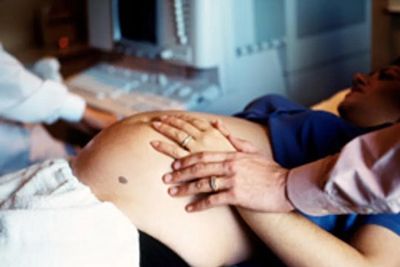Near the end of your first trimester and early in the second trimester, your health care professional will talk with you about a variety of prenatal tests to assess the health of the fetus. It's up to you which ones you have done but there are a lot of factors to consider when deciding, so discuss them all thoroughly with your health care professional.
I had a wonderful pregnancy but, with all of the excitement and anticipation—not to mention all of the planning and preparing for my baby's arrival, I had my share of mommy-brain fogginess and forgetfulness.
One of the more frustrating things I had difficulty keeping straight was everything my obstetrician told me about prenatal tests. I couldn't remember which tests were for what, how they would be administered or when they would be performed. That made deciding which tests would be right for my baby and me all the more difficult.
In case you've found yourself in a similar situation, here is a rundown of the seven most common prenatal tests with basic information on each.
Genetic screening
What? If you have a family history of inherited diseases such as, Tay-Sachs or thalassemia, consider genetic counseling to assess your risk of having a child with the disease. It is standard to offer all couples screening for cystic fibrosis. Certain ethnicities may predispose you to carrying genetic disorders.
When? Ideally, this should be performed before conception, but may be done early in the pregnancy.
Where? The screening begins with an in-office discussion with a genetic counselor and may involve some blood tests.
Chorionic villus sampling (CVS)
What? Placental cells are removed and tested for chromosomal and genetic disorders.
When? 10 to 13 weeks.
Where? Performed as an in-office procedure.
First trimester genetic screening
What? Uses ultrasound to assess the fold in the back of the fetus's neck and for the presence of the fetal nasal bone. The ultrasound is then combined with a blood test to determine the risk of Down syndrome. Risk of trisomies for chromosomes 13 and 18 are also assessed.
When? 11 to 13.6 weeks.
Where? Performed as an in-office procedure.
Amniocentesis
What? Using ultrasound as a guide, your health care professional will withdraw amniotic fluid from the amniotic sac with a needle for examination and testing. This test can provide information on many chromosomal and genetic abnormalities, including Down syndrome and neural tube defects. You also have the option of collecting and banking any excess fluid drawn, but not used for testing, for possible later use.
When? After 15 weeks, typically at 16 to 20 weeks.
Where? Performed as an in-office procedure.
Ultrasound
What? Sound waves are used to help identify gestational age, detect multiple pregnancies and identify any structural anomalies.
When? 18 to 20 weeks.
Where? Typically performed in the office or in a diagnostic center.
Integrated screening
What? Uses a combination of first and second trimester screening to assess the risk of genetic disorders (trisomy 13, 18 and 21).
When? 11 to 22 weeks.
Where? Performed in the office.
Second trimester serum marker screening
What? Blood test used to screen for neural tube defects and trisomies 21 and 18 (genetic disorders, also known as Down syndrome and Edwards syndrome).
When? 15 to 22 weeks.
Where? Performed in the office.
Deciding which prenatal tests may be right for you can be confusing. Speak with your health care professional—your obstetrician, nurse practitioner or nurse midwife—about your testing options and ask lots of questions.
To read more, visit our Pregnancy & Parenting Center
Prenatal Tests: The What, Why, When and Where of 7 Common Prenatal Tests
January, 25 2011
Prevention & ScreeningsHealthyWomen content is for informational purposes only. Please consult your healthcare provider for medical advice, diagnosis or treatment.

Everything you need to know about women’s health — in one place.

WomenTalk: The 411 on Femtech Questions
In this episode of WomenTalk, we’ll talk about all things femtech.
December, 23 2024
VideosHappy Holidays from HealthyWomen
It’s the most wonderful time of the year to take care of yourself
December, 23 2024
Your WellnessDoctors Shrugged Off My Cough Because I Wasn’t a Smoker — but I Had Stage 4 Lung Cancer
I’m not the only never smoker with lung cancer, and physicians need to do better
December, 19 2024
Real Women, Real StoriesShould You Do a Breast Self-Exam?
The formal breast self-exam is no longer recommended — but breast awareness is. Here’s what you need to know about breast cancer screening.
December, 19 2024
Your BodyiStock.com/Drazen Zigic
¿Deberías examinar tus mamas?
Ya no se recomiendan los autoexámenes de mamas, pero sí la autoconciencia mamaria. Aquí encontrarás lo que debes saber sobre las examinaciones del cáncer de mama.
December, 19 2024
Your BodyiStock.com/Drazen Zigic
